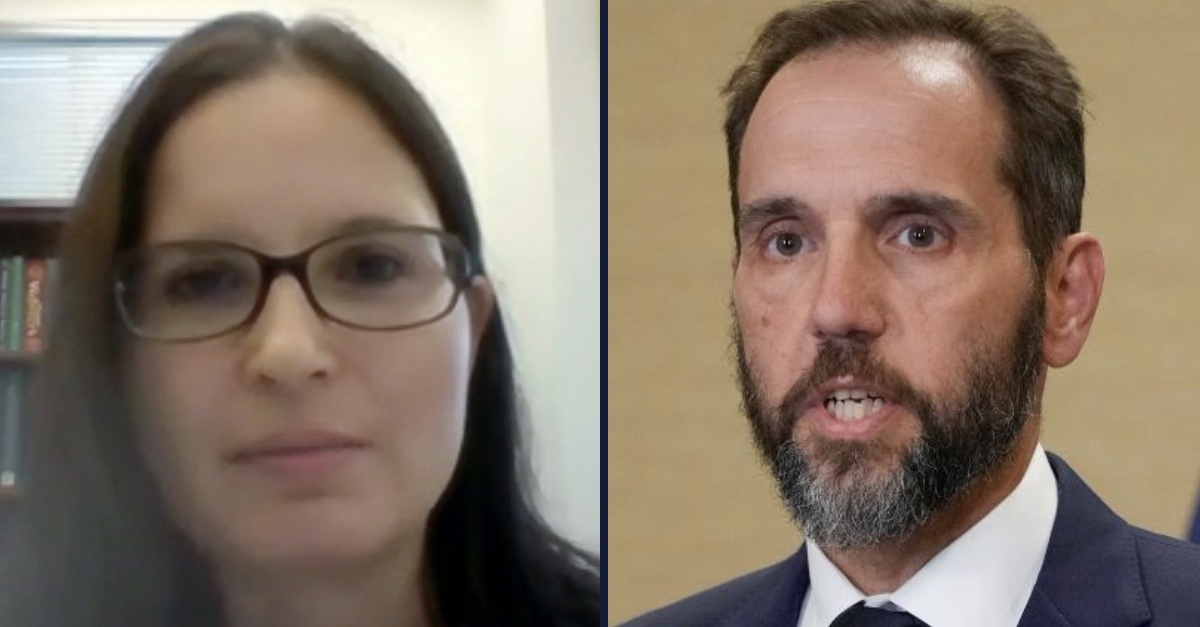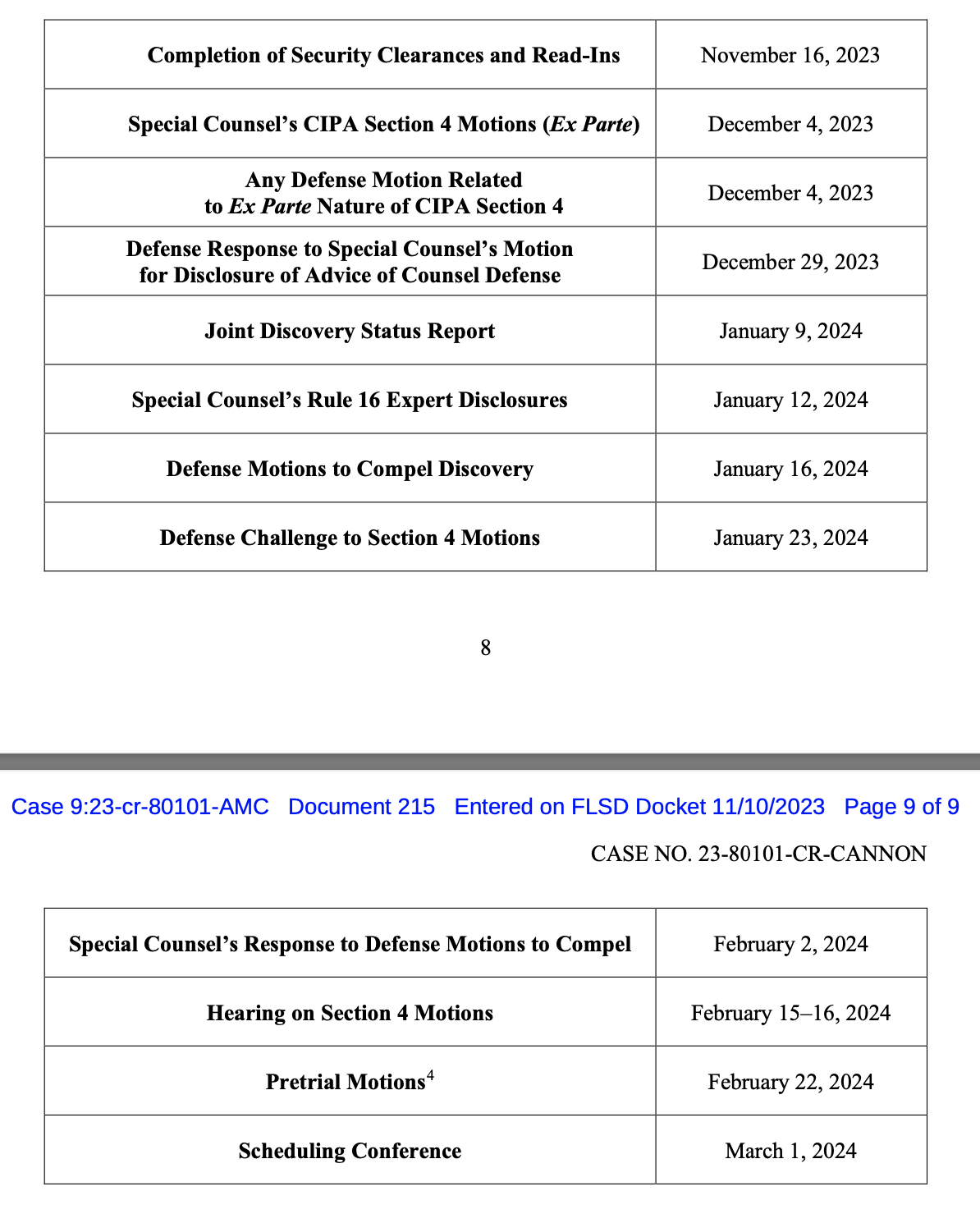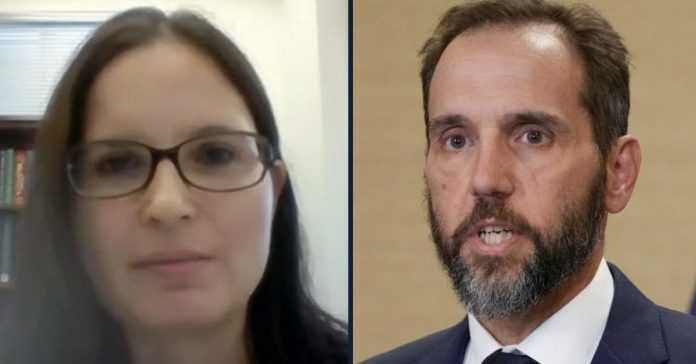
Judge Aileen Cannon (left) during a Senate Judiciary Committee oversight nomination hearing on July 29, 2020 (U.S. Senate via AP), Special counsel Jack Smith (right) speaks about an indictment of former President Donald Trump, Aug. 1, 2023, at a Department of Justice office in Washington. (AP Photo/Jacquelyn Martin)
After hearing arguments between special counsel Jack Smith and Donald Trump’s lawyers in Florida federal court more than a week ago, U.S. District Judge Aileen Cannon on Friday revealed a new set of pretrial deadlines in the Mar-a-Lago case while, in essence, leaving up in the air a request by the former president and his codefendants to push trial past the 2024 election.
The Friday order partially granted the requests made by Trump, his valet Walt Nauta, and Mar-a-Lago property manager Carlos De Oliveira to push back, among other things, key discovery-related deadlines. What Judge Cannon did not do is issue a decision on whether or how much to grant the defendants’ motion to adjourn the trial date.
The judge denied that motion to continue trial without prejudice, meaning it can be brought again later. Cannon specified that the issue can be considered at a March 1, 2024, scheduling conference, once litigation under §4 of the Classified Information Procedures Act (CIPA), wrangling over discovery, and pretrial motions are out of the way.

In summary, based on the new schedule, we may learn on or around March 1 next year whether the current May 20 trial date is going to be moved.
As Law&Crime reported one week ago, Judge Cannon agreed to stay pretrial deadlines and said that an order would follow.
During a Nov. 1 hearing, the judge remarked that she had “a hard time seeing how realistically this (current schedule) would work,” even as the Special Counsel’s Office urged her not to let their Jan. 6 federal case “drive the schedule here,” the Associated Press reported.
After the hearing, Jack Smith and prosecutor Jay I. Bratt submitted a filing alerting Cannon to a defense motion in the Washington, D.C., Jan. 6 prosecution, a motion which sought a stay of “all proceedings” until the former president’s renewed “presidential immunity” claims were resolved.
The Special Counsel’s Office complained that Trump’s lawyers made no mention at the Nov. 1 hearing that they planned to file the D.C. motion to stay. Jack Smith asserted that the Trump motion was just more evidence that the defense will only continue its delay tactics in both federal cases — and “at any cost.” The special counsel urged Judge Cannon, a Trump appointee, not to be “manipulated” by such tactics.
Cannon reasoned in her Friday order that “the Court deems it most prudent, given the evolving complexities in this matter, to adjust the first batch of pre-trial deadlines” while denying Trump et al.’s motion to push back trial as “premature.” The denial, however, was issued without prejudice and with the understanding that the motion will be discussed again after the pretrial hurdles are cleared.
Cannon identified four reasons for her decision, calling the “quantity of discovery” — which “remains exceedingly voluminous” — the most significant factor:
First, and most significantly, the quantity of discovery in this case remains exceedingly voluminous, even more so than initially thought. To be sure, the Special Counsel has taken various steps to produce discovery on a regular basis. But even with these efforts, discovery has increased sizably from initial estimates; classified discovery did not become available to Defendants in its complete form (including on substantive counts) until October 17, 2023; clearance and read-in procedures have only recently reached near-closure for assembled counsel of record; and discovery review as a whole has generated concrete challenges given the sheer amount of the materials and the sensitivities of the information involved. These evolving and unforeseen circumstances require a reevaluation of the initial period for defense discovery review as contemplated initially in the Court’s July 21, 2023, Order. And they make plain to the Court what due process requires: Defendants need more time to review the discovery in this case. This Order aims to afford that opportunity in a reasonable fashion, balanced against the public’s right to a speedy trial.
Secondly, CIPA §4 litigation will take time, “is not simple, and […] must be done carefully and in a manner attuned to the sensitive nature of the information involved and to the competing legal theories of the case as presented by all sides.”
In addition, Trump and his codefendants have revealed they will seek discovery not just from Jack Smith and the FBI, “but also from other government agencies,” the judge said.
“Without expressing any view on the merits of those anticipated motions, it is evident that the parties are at odds on significant issues related to the scope of discoverable information in this case, and that such disagreements will require substantial judicial intervention,” the order said. “This too adds complexity to this case, both as a matter of briefing, Court review, and future rounds of CIPA Section 4 litigation.”
A fourth issue that could be relevant for the May trial date in the Mar-a-Lago case is the fact Trump faces two other criminal cases with March trial dates: the federal Jan. 6 case and Manhattan DA Alvin Bragg’s (D) lingering New York State falsification of business records prosecution.
From the order:
Fourth, although less important at this stage, the Court cannot ignore the realities of pre- trial and trial schedules in two other criminal matters identified by defense counsel: United States v. Trump, No. 23-cr-257 (D.D.C. 2023), in the United States District Court for the District of Columbia, in which Defendant Trump faces trial currently scheduled to begin on March 4, 2024, estimated to last anywhere from four to eight weeks (possibly more), and People v. Trump, Index No. 71543/2023 (N.Y. Sup. Ct. 2022), a separate criminal case in the state of New York, initiated prior to this case and currently scheduled for trial on March 25, 2024. Defendant Trump recently filed an opposed motion to stay in the District of Columbia, and a scheduling conference in the New York matter reportedly is set for late February 2024. Although the Special Counsel is correct that the trajectory of these matters potentially remains in flux, the schedules as they currently stand overlap substantially with the deadlines in this case, presenting additional challenges to ensuring Defendant Trump has adequate time to prepare for trial and to assist in his defense.
Have a tip we should know? [email protected]

